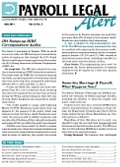The government shutdown means hundreds of thousands of federal employees aren’t at work, but it doesn’t mean employers get a pass on complying with the tax code and the nation’s employment laws.
No change in tax compliance requirements
According to the IRS Fiscal Year 2014 Shutdown Contingency Plan, employers must continue to make tax deposits. Automated collections will continue, as well. Click here to see the tax compliance calendar for October 2013.
What’s suspended: Anything requiring face-to-face contact with an IRS rep: audits, taxpayer assistance and assistance from the National Taxpayer Advocate.
Department of Labor enforcement stalls
What does the shutdown mean for Department of Labor (DOL) enforcement activities? Enforcement efforts will grind to a halt because only “essential” staff are allowed to work.
A memo issued to DOL staffers on Sept. 25 decreed that the department would “continue to produce weekly unemployment insurance claims reports”—but do almost nothing else. Here’s how that is playing out at the enforcement agency level:
- Of 986 workers in the Employee Benefits Security Administration, only 46 are deemed essential.
- The 219 employees of the Office of Labor Management Standards have been reduced to one.
- OSHA, which normally has 2,235 employees, is getting by with a skeleton crew of 230.
- The Wage and Hour Division—usually 1,829-strong—is down to six.
However, don’t think you’ll be able to get away with much during the shutdown. Eventually, Congress will approve an FY2014 budget—and all those DOL enforcers will be back, rested and ready to catch labor scofflaws.
No EEOC investigations or enforcement
Of the usual 2,164 EEOC staff members, only 107 remain on duty during the shut down.
The EEOC continues to record new discrimination and harassment complaints, but will take no action on them until Congress approves a budget. EEOC cases that are currently being litigated will continue, and EEOC attorneys are on hand to request temporary injunctions in emergency cases.
EEOC staff are not available to answer questions from the public.
E-Verify offline
U.S. businesses will not be able to access E-Verify, the Internet-based system that allows employers to voluntarily determine the eligibility of prospective employees to work in the United States. Over 404,000 employers are enrolled, with more than 21 million queries run through the system during FY 2012.

